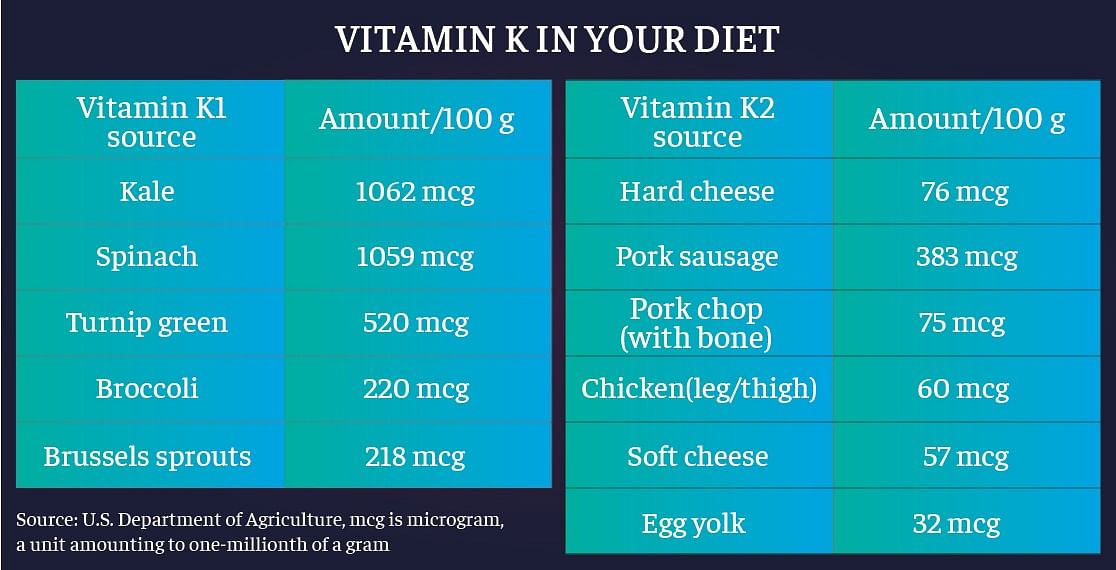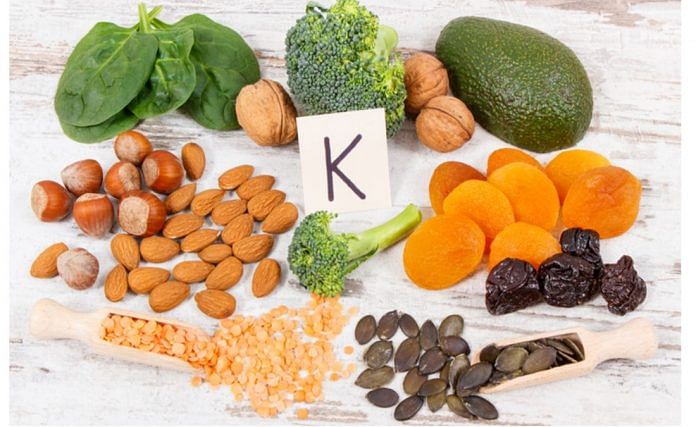Thrombosis, or the formation of clots in blood vessels, is a major manifestation of Covid-19 that contributes to poor outcomes. But the vitamin universe may hold a possible solution.
Vitamin K plays an important role in multiple ways that could prevent thrombosis, as well as elastic fibre degradation in cardiac and lung muscles. Vitamin K also has a vital role in preventing comorbid conditions, which are known to be a risk factor in aggravating Covid-19.
Vitamin K is a fat-soluble vitamin and a group of compounds, of which the most important are Vitamin K1 and K2. Vitamin K2 is believed to be superior as it circulates in the blood longer than K1. Where Vitamin K1 may stay in the blood for several hours, some forms of K2 can remain in the blood for days.
The main function of Vitamin K is to activate proteins that serve important roles in blood clotting, heart health, and bone health.
The potential role of Vitamin K — found in greens like spinach and kale, and meats like chicken and pork — in preventing the development and progression of severe Covid-19 lacks scientific exploration.
But given its many benefits, it is important to assess the role of Vitamin K for Covid-19 through observational as well as randomised control trials, especially as a standard treatment for the disease remains elusive yet.
Here are five possible mechanisms that suggest Vitamin K could be an important factor in preventing a severe manifestation of Covid-19.
Also Read: 5 ways in which Vitamin D can help prevent multiple organ damage from Covid
- Matrix Gla Protein
Matrix Gla Protein (MGP) is a Vitamin K-dependent inhibitor of soft tissue calcification or build-up of calcium in soft tissue, and elastic fibre degradation.
MGP protects against degradation of elastic fibres, which provide deformability — and, thus, flexibility and resilience — to lungs and arteries, and facilitate respiration and circulation.
The balance between elastic fibre degradation and repair is of vital importance in cardiac and pulmonary health, the two systems worst affected by Covid-19.
2. Endothelial S protein
Vitamin K plays a crucial role in the activation and production of 50 per cent of the anticoagulant protein S outside the liver. This protein plays a major role in preventing local thrombosis.
On the endothelial cell surface, this protein associates with the cell surface and promotes a Vitamin-K dependent clotting factor — pro-anticoagulant factor V — in the presence of another activated protein known as protein-C.
3. Comorbidities and desphospho-uncarboxylated MGP (dp-ucMGP)
Comorbid conditions such as diabetes type 2, hypertension, chronic kidney disease, obesity, etc, are known to exacerbate the severity of Covid-19 and the risk of mortality from the disease.
Desphospho-uncarboxylated MGP (dp-ucMGP) is a biomarker to assess Vitamin K insufficiency. A peer-reviewed study published in August said researchers had found signs of severe extrahepatic Vitamin K insufficiency — deficiency of Vitamin K outside the liver — in Covid-19 patients.
This assessment was based on the discovery of an elevated level of dp-ucMGP. The reason for this elevation could be the presence of a comorbid condition, which probably accelerated further in the absence of adequate Vitamin K.
Studies have demonstrated elevated dp-ucMGP levels in patients of various comorbid diseases such as diabetes mellitus, hypertension, cardiovascular disease, chronic kidney disease, and obesity.
The association between dp-ucMGP and comorbid conditions suggests that Vitamin K deficiency might increase the risk of developing and worsening comorbid conditions. However, increased Vitamin K demand due to higher utilisation for regular physiological functions may be another reason for enhanced dp-ucMGP.
Also Read: Too much turmeric, methi, vitamin D — Doctors fight new emergencies driven by Covid fear
4. Synergy between Vitamins D and K
Vitamins D and K are correlated because they are present in many of the same dietary sources.
Vitamin D is already being studied widely as an important immunomodulatory factor associated with Covid-19 disease severity and mortality.
Vitamins K and D have an antagonistic relationship, as demonstrated by a 2001 study involving 16 rats.
According to the study, administering high doses of Vitamin D in rats depleted their extrahepatic Vitamin K stores by increasing MGP synthesis. This, the researchers suggest, lead to acceleration in elastic fibre calcification and degradation.
Thus, Vitamin D administration in a state of Vitamin K deficiency may endanger pulmonary and vascular health.
A study this year reported that administering Vitamin D supplements among stable kidney transplant recipients with insufficient levels of Vitamin K was associated with premature death. This association suggests that low levels of extrahepatic Vitamin K should be addressed before a patient is administered Vitamin D supplements.
5. Immunity and inflammation
High Vitamin K status can exert a protective role in the inflammatory and mineralisation processes associated with the onset and progression of age-related diseases.
Vitamin K can act as an anti-inflammatory agent by suppressing expression of nuclear factor κB (NFκB) signal, which is a potential contributor to inflammation. As a potential antioxidant, Vitamin K may also exert a protective effect against oxidative stress by blocking the generation and accumulation of reactive oxygen species that leads to inflammation.
Dietary sources
- Vitamin K1: Produced by plants, is the predominant form of Vitamin K in the human diet.
- Vitamin K2: Found in fermented dairy products, pork, chicken, and egg yolk.

According to the Food and Agriculture Organization and the World Health Organization, the recommended Vitamin K allowance for adults ranges from 75 to 90 mcg/day.
However, the level of Vitamin K consumption an individual needs should be decided in consultation with a professional nutritionist.
The writer is a clinical and public health nutritionist and researcher
Also Read: Vitamin D supplement calcifediol could reduce death risk in Covid patients, Spanish study says



